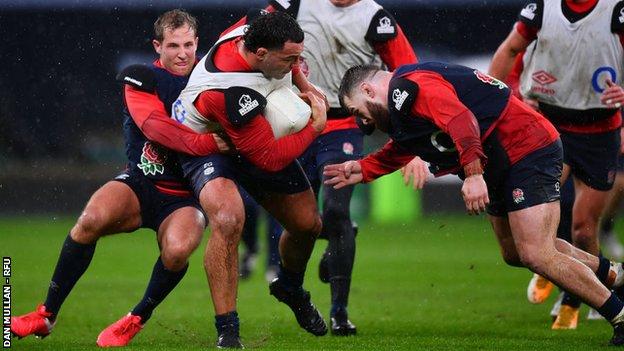ARTICLE AD BOX
 Ellis Genge (centre), Max Malins (left) and Luke Cowan-Dickie during an England training session in December
Ellis Genge (centre), Max Malins (left) and Luke Cowan-Dickie during an England training session in DecemberContact training will be reduced across rugby union in an attempt to prevent injuries and protect player welfare.
World Rugby guidance will limit full-contact training to 15 minutes a week after research showed 35-40% of injuries occurred in training.
Six hundred players in 18 competitions were consulted as well as coaches and strength and conditioning experts.
"This reflects our ambition to advance welfare for players at all levels," said World Rugby boss Alan Gilpin.
Joe Schmidt, World Rugby director of rugby and high performance and former Ireland head coach, added: "Training has increasingly played an important role in injury prevention as well as performance.
"While there is a lot less full-contact training than many people might imagine, it is our hope that having a central set of guidelines will further inform players and coaches of key considerations for any contact that is done during training."
However, while training patterns vary across teams and competitions, player feedback revealed that players were currently subjected to an average of 21 minutes per week of full-contact training, while it is understood some players would do as many as 140 minutes in a heavy week.
A group of former players are taking legal action against the governing bodies after being diagnosed with signs of early-onset dementia following their playing careers, and have led calls to reduce the levels of physicality away from match-days.
As well as the 15-minute limit on full contact training, World Rugby also hopes to cap "controlled contact" training - such as using shields and tackle pads - to 40 minutes per week, with a maximum on set-piece training of 30 minutes per week.
While not mandatory, World Rugby expects the guidelines to be adopted at all levels of the game, with the Leinster senior coach Stuart Lancaster - who acted as a consultant throughout the process - pointing out the advantages a reduced training load can have on performance.
"We have a responsibility to make the game as safe as possible for all our players," Lancaster said. "For coaches, optimising training plays a significant role in achieving that objective. It is important that we do not overdo contact load across the week in order that players are fresh, injury-free and ready for match days."
The governing body will monitor and review the implementation of the guidance and the impact it will have on injury rates, with World Rugby figures suggesting limits on training loads could soon be mandated and teams obliged to follow the guidelines in order to compete at the 2023 Rugby World Cup.
"It would certainly be our intention to write it into the terms of participation for future Rugby World Cups," said Mark Harrington, World Rugby director of technical services.
"It is a soft guideline for the minute, but I think over time it will gain some teeth."

- Who is Marvel's latest superhero? Movies With Ali Plumb reveals all about Shang-Chi
- How to eat well at university: BBC Food has top tips for budgeting, planning and keeping things tasty


 3 years ago
56
3 years ago
56








 English (US) ·
English (US) ·